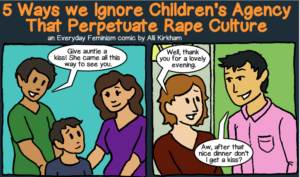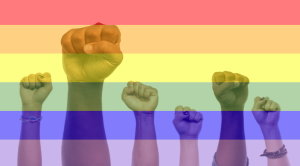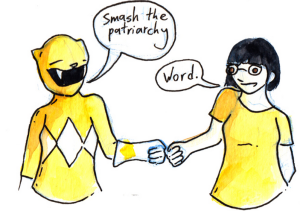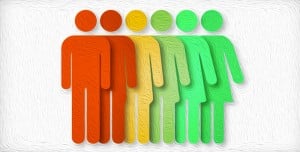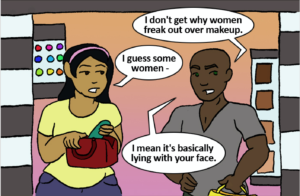I remember the first time I used the word transgender. I was a college student at a queer conference, nervously waiting to introduce myself to the group.
I knew that I didn’t identify with the gender I was assigned at birth – but I wasn’t on hormones, didn’t have any kind of surgery, and wasn’t sure if I wanted either of those things.
I had used words like genderqueer and non-binary to describe myself, which were also truthful, but those words also made me feel like I was on the outs with a community I so desperately wanted to connect with.
“I’m Sam, and I’m…” I paused. “You know what? I’m transgender. And I’m tired of feeling like I can’t use that word just because I’m unsure of medically transitioning. I don’t know what I want, but I know who I am.”
It was the first time I’d ever said it aloud. I’m transgender. And I couldn’t stop smiling.
The group began to clap and cheer. As others began to introduce themselves, I heard much of the same – there were many of us who’d felt afraid of using that word, but because I had the courage to name myself, others felt they could do the same.
Years later, I’m writing publicly and unapologetically about my transness. And by far, the biggest pushback I receive is the accusation that I’m not “trans enough” to be doing this work.
Even after I started testosterone, I was attacked – namely by transmedicalists, who I’m sure are already writing angry tweets to me right now – because no matter what I do, I’ll never really be transgender according to them until I check off all the imaginary boxes of what it means to be trans.
If my narrative fails to be typical in any way – I didn’t always know, I’m not dysphoric enough, I haven’t had enough medical interventions, I’m too feminine, I’m not happy enough with my transition (yes, seriously) – I’m ostracized by folks both within and outside of the community.
And it used to really bother me. What did I need to do to be seen as “enough?” What did I need to do to be believed? What did I need to do to be seen?
After years of doing this work, I’ve adopted a pretty simple philosophy: Fuck ‘em.
No, really. There will always be someone out there trying to undermine my identity. There will always be someone – even other trans people, situated in their own insecurity and internalized trans-antagonism – that need to put me down to feel more solid in themselves.
Fuck ‘em.
For every one of them, I’ll write another article to make sure trans folks like us feel affirmed, valued, and believed. That’s my job. To uplift you – and yes, piss them off, too – I want to validate people like us, people who may worry that they aren’t “trans enough” after all.
Because, spoiler alert, we are.
1. Your Gender Isn’t Up for Debate
Once upon a time, I wrote a pretty fabulous Transgender 101 Guide in which I affirmed that the only criteria for being transgender is that you identify with a different gender than the one assigned to you at birth.
The operative words here being “you identify.” That’s because your gender isn’t up for debate. Your gender doesn’t belong to anyone else. It’s yours.
To me, this isn’t a radical concept.
Gender is about our internal sense of self.
It’s the language with which we communicate who we are, and how we relate to ourselves through this lens of masculinity, femininity, androgyny, and the like.
Your body doesn’t determine what your gender is. Your parents don’t determine what your gender is. Strangers harassing you on Twitter don’t determine what your gender is (do I seem bitter? Good, because I am).
Your identity is yours – it’s not a survey. It’s not an interrogation. It’s not a spectacle. It’s not American Idol, where everyone gets a vote.
No one knows you better than you know yourself. Anyone claiming they do is wrong.
2. Being Transgender Isn’t a Competition
I’ll sing this tune until the cows come home (or, you know, until trans folks stop treating each other this way).
Someone is not more or less transgender because of the medical interventions they’ve had, how well they “pass,” or how well they conform to cisnormative ideas of transness.
And when we pit transgender folks against each other, no one wins – because comparison games only reinforce the idea that being transgender is about how we’re perceived, rather than who we know ourselves to be.
We’re disempowering ourselves and our community every time we say that our gender is for someone else to decide.
All this accomplishes is a kind of gatekeeping that prevents trans people from accessing the support and resources they need.
I discuss this at length in this article about trans folks supporting other trans folks (which is more of an issue than you’d expect!).
There’s no competition when it comes to being transgender. It’s not about being more or less “valid” than anybody else. Anyone who treats it like a competition is just reinforcing a really harmful idea that being trans is about as closely resembling cis people as possible – which plays right into trans people’s oppression.
Testosterone didn’t make me “more” transgender or somehow change who I am. Frankly, it just gave me a heck of a lot more leg hair. And the last time I checked, that doesn’t make me special.
3. There Is No Wrong Way to Be Transgender
No two trans folks will have an identical journey.
Some people seem to think that’s a problem – I actually think it’s totally rad.
The fact that our community is so diverse, constantly creating new language and new pathways to self-actualization, is what makes us powerful. With more possibilities, people are free to pursue their happiness and be who they really are, however that might look.
Why the heck would we ever want to stifle or limit that?
I don’t want to live in a cookie-cutter land of conformity. I want people to feel liberated. I want people to be able to explore and expand.
I want gender to be playful, to have limitless possibilities, and I want it to be revolutionary.
And that’s why I strongly believe that there isn’t a wrong way to be transgender – because the moment we defy what society has told us we must be, the possibilities are truly endless.
People who want to tell you that there’s a set number of ways to transition (and that you must transition at all) are really boring and unimaginative people. I feel sorry for them. You probably should, too.
4. You Don’t Have to Be Certain
This is the part of the article where people find me on Twitter (look, I hyperlinked it to save you the trouble) and start yelling at me in all caps.
OMG. How dare I suggest that trans people can be unsure of their gender!
It’s easy to look at trans folks who have known they were trans from the time they emerged from the womb and feel “less than.” But please realize that their story is actually not everyone’s story.
In fact, things like trauma, mental illness, and a lack of access to resources and information can impact the timeline on which we come to know ourselves as transgender, among other things.
For me, it was all three. And it continues to impact the way I conceive of my identity to this day.
There is nothing wrong with having questions and uncertainty around your identity.
Identity is a process, not a race. Some of us have been acquainted with our genders our entire lives. Some of us are just getting cozy.
It’s not better or worse. It just is!
5. You Aren’t the Only One to Feel This Way
Some of the most fierce trans activists that I know still have days in which they don’t feel like they’re “enough.”
I’m writing this article, and I can guarantee you I’ll need to reference it in the future, when I inevitably hit that point of feeling like I’m not as trans as everybody else.
This is because it’s not easy to shake all the trans-hating and cisnormative messages we receive from the media and even from other trans people, telling us that if we don’t conform to certain ideals around transness – ideals that suspiciously resemble the aesthetics and even experiences of cisgender people – we are deeply lacking.
You are not the only trans person to feel the weight of this. I am hard-pressed to find a trans person who doesn’t.
And this weight is sometimes what pushes trans people to act as gatekeepers in the community – which while it isn’t acceptable, it’s understandable if you think about the world in which we’re trying to survive.
It helps to remember that we’re all hurting from this. We all carry the wounds. Some are wide open, others scarred to the point where we sometimes forget. You aren’t alone in this struggle.
And that’s why…
6. We Need You
After I named myself as transgender for the first time, countless people approached me afterward to tell me that they, too, felt they could name themselves for the first time because someone else had the courage to do so.
It started a chain reaction around the room, an impact I never realized I could have.
That day, I learned something important: Every time a transgender person does the brave thing of unapologetically owning their identity, they create a space where other trans people can do the same.
I know what it’s like to not feel “trans enough.” But I also know what it’s like to see another trans person living their truth – someone who isn’t quite typical, someone whose narrative doesn’t fit what’s expected – and feeling inspired to do the same.
That inspiration is powerful.
***
Whether it’s being public and out about your transness, or simply affirming it for you and only you, living your truth is a brilliant and radical act.
We all need to see ourselves reflected in someone else.
We all need to hear a story that mirrors our own, to be reminded that we aren’t alone and that we are enough exactly as we are. And that’s why trans people like us are necessary – that’s why our visibility and our stories are vitally important.
Nowadays, when people tell me I’m not “trans enough” to do this work, I can’t help but smile.
I smile because that’s exactly why I’m doing it.
[do_widget id=’text-101′]
Sam Dylan Finch is a Contributing Writer at Everyday Feminism. He is a transgender writer, activist, and educator based in the San Francisco Bay Area, exploring the intersections of mental illness and queerness. He is also the founder of Let’s Queer Things Up!, his beautifully queer blog. You can learn more about him here and follow him on Twitter @samdylanfinch. Read his articles here.
Search our 3000+ articles!
Read our articles about:
Our online racial justice training
Used by hundreds of universities, non-profits, and businesses.
Click to learn more






